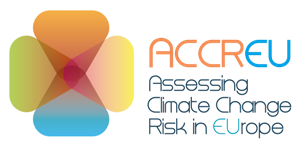Co-design approach
The ACCREU project is dedicated to producing research that directly supports evidence-based decisions and policy-making. To this end, the project adopts a co-creation approach that actively engages stakeholders in the project’s design and research activities.
ACCREU builds on the outcomes of COACCH (CO-designing the Assessment of Climate CHange costs), a research project on the economics of climate change that developed best practice for climate research co-design and co-production (McGlade et al., 2022). European economic cost studies on climate change had previously limited their outreach to the communication of results. COACCH led a step-change by inviting stakeholders to collaboratively design and produce research on the economics of climate change.
The ACCREU project will build on this approach to co-create research in three phases:
- The first phase is co-design, where the project team and stakeholders identify common interests and jointly develop research questions.
- This is followed by co-production, an iterative process where the project team work with stakeholders on chosen case studies to produce cutting-edge research with policy synergies.
- In the final co-delivery stage, the project team and stakeholders develop communication strategies and products to translate project results and support uptake into practice.
The entire project is characterised by this inclusive approach, from defining research questions and policy scenarios to delivering outreach activities and impact.


In line with the co-creation principles, ACCREU is engaging with a diverse group of stakeholders representing a range of European regions, sectors and interests. From this group, some organisations have been identified as key end-users and have been offered the opportunity to engage more deeply in specific use-cases.
ACCREU’s co-creation practices are mainly focused on producing useable knowledge for decision making. However, ACCREU will also bring together academic and non-academic actors to test open and emergent forms of co-creation. These methodologies will be used to support discussions that can challenge existing thinking and narratives and explore pathways on the economics of transformational adaptation.
Curricular Economy
More fuel-efficient aircraft. More direct and on-time flights. Safer skies and airports. We're found on virtually every commercial, defense and space aircraft.
Energy & Climate
Since 2010, our facilities have implemented more than 4,300 efficiency projects including building automation and controls, lighting and mechanical upgrades, saving more than $80M (annualized).
Operations
Over 100 years ago, we defined energy efficiency by making indoor comfort automatic. Today, we redefine it in 10 million buildings using our technology.
Human Rights
Each year, we keep over half a billion workers safer and more productive with voice-enabled software, barcode scanners, mobile computers and protective equipment.
Conflict Minerals
We pioneered automation control. So we understand complex industrial facilities, and how to create high-quality and high-performance chemicals and materials.
Natural Infrastructure
We provide resources and financial support to causes around the world and encourage employee volunteerism.
Sustainability Report
— View Infographics
